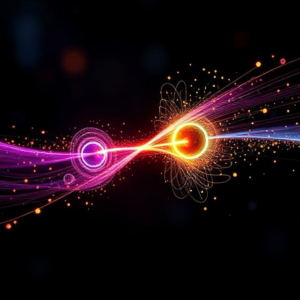1. Particle Nature of Light:
The particle nature of light refers to the idea that light behaves not only as a wave (like we typically think of) but also as a particle. These particles of light are called photons. Each photon carries a specific amount of energy, which depends on its color (or wavelength).
An example of the particle nature of light is the photoelectric effect, where light shining on a metal surface can knock electrons off the metal. This happens only when the light has a certain frequency, showing that light comes in discrete packets (photons), each with enough energy to dislodge the electrons.

2.Particle Physics:
Particle physics is the branch of physics that studies the smallest particles in the universe. These particles are the building blocks of all matter, and they include things like electrons, protons, and quarks.
In particle physics, scientists try to answer big questions like:
- What is everything made of?
- What are the forces that control how these particles interact?
- Why do particles behave the way they do?
Scientists use particle accelerators (like the one mentioned earlier) to accelerate particles to high speeds and smash them together to see what happens. By analyzing the results of these collisions, they learn about the basic structure of matter.
Key Concepts in Particle Physics:
- Quarks: Tiny particles that make up protons and neutrons.
- Leptons: Particles like electrons and neutrinos.
- Force carriers: Particles like photons (which carry the electromagnetic force) and gluons (which carry the strong force).
- The Standard Model: This is the current theory in particle physics that explains how the known fundamental particles and forces interact.
3. Particle Accelerator:
A particle accelerator is a machine that speeds up particles (like protons or electrons) to incredibly high speeds, close to the speed of light. Once the particles are moving fast enough, they are made to collide with each other. These collisions release energy, and by studying the debris from these collisions, scientists can learn about the fundamental particles and forces that make up the universe.
Particle accelerators are essential in particle physics because they allow scientists to test theories about the smallest particles and uncover new particles, like the Higgs boson, that help explain how everything works.
Summary :
- Particle Nature of Light: Light behaves as both a wave and a particle (photon), carrying energy in discrete packets.
- Particle Physics: The study of the smallest particles of matter and the forces that govern them, using particle accelerators.
- Particle Accelerator: A machine that speeds up and collides particles to study fundamental particles and forces.











